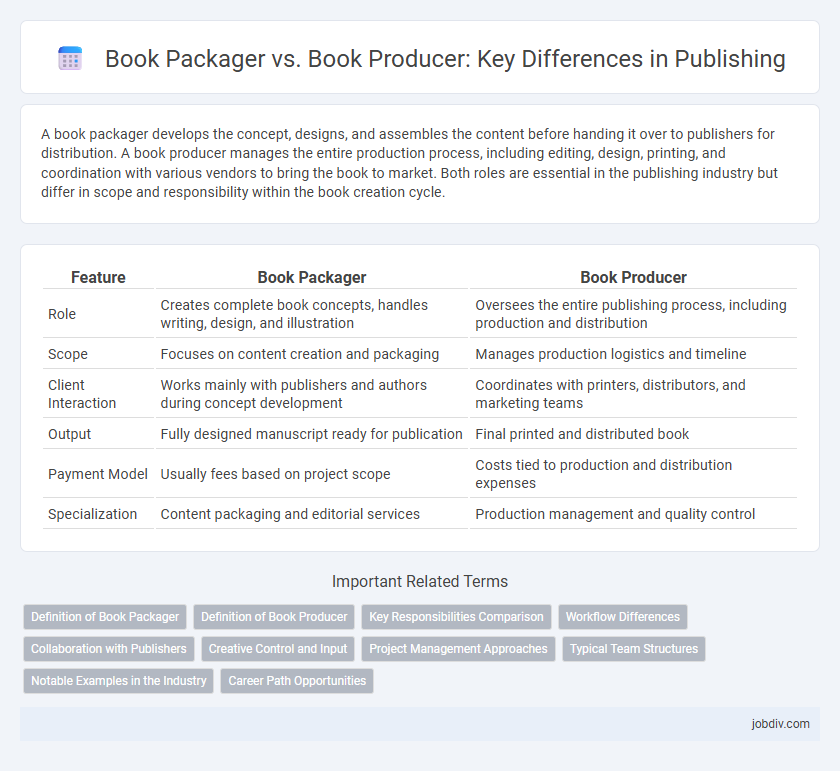A book packager develops the concept, designs, and assembles the content before handing it over to publishers for distribution. A book producer manages the entire production process, including editing, design, printing, and coordination with various vendors to bring the book to market. Both roles are essential in the publishing industry but differ in scope and responsibility within the book creation cycle.
Table of Comparison
| Feature | Book Packager | Book Producer |
|---|---|---|
| Role | Creates complete book concepts, handles writing, design, and illustration | Oversees the entire publishing process, including production and distribution |
| Scope | Focuses on content creation and packaging | Manages production logistics and timeline |
| Client Interaction | Works mainly with publishers and authors during concept development | Coordinates with printers, distributors, and marketing teams |
| Output | Fully designed manuscript ready for publication | Final printed and distributed book |
| Payment Model | Usually fees based on project scope | Costs tied to production and distribution expenses |
| Specialization | Content packaging and editorial services | Production management and quality control |
Definition of Book Packager
A book packager is a specialized publishing service that creates complete book projects, including concept development, writing, editing, design, and production, which are then sold to publishers. Unlike traditional book producers who may focus primarily on printing and manufacturing, book packagers manage the entire creative process, often working behind the scenes to deliver ready-to-publish manuscripts and layouts. This model streamlines publishing operations and allows publishers to outsource development while retaining rights and marketing control.
Definition of Book Producer
A book producer is a publishing professional responsible for overseeing the entire book creation process, from conceptualization to final delivery. They coordinate with authors, editors, designers, and printers to ensure the book meets quality standards and deadlines. Unlike book packagers, who primarily supply ready-made content or formats, book producers manage the project's workflow and production logistics.
Key Responsibilities Comparison
Book packagers primarily handle concept development, manuscript sourcing, and design coordination, creating ready-to-publish content for publishers. Book producers oversee the entire production process, managing schedules, budgets, and liaising between authors, editors, and printers to ensure timely delivery. The key responsibility difference lies in packagers focusing on content creation, while producers concentrate on project management and final production logistics.
Workflow Differences
Book packagers manage the entire book creation process internally, from concept development and writing to design and editing, delivering a complete manuscript ready for publication. Book producers focus more on coordinating external vendors such as authors, illustrators, and designers, overseeing the project timeline without directly handling content creation. Workflow differences lie in book packagers' in-house control versus book producers' role as intermediaries managing collaborative contributions.
Collaboration with Publishers
Book packagers collaborate closely with publishers by developing complete, market-ready book projects that include content creation, design, and production, streamlining the publishing process. Book producers coordinate various creative professionals and manage the production logistics, ensuring that all elements align with the publisher's vision and deadlines. Both roles require seamless communication and cooperation with publishers to deliver high-quality titles efficiently.
Creative Control and Input
Book packagers typically maintain greater creative control by overseeing concept development, design, and content creation before handing the project to publishers for distribution. Book producers focus on project management and logistics, coordinating between authors, designers, and printers with less emphasis on creative decisions. The distinction lies in packagers shaping the book's vision, while producers ensure execution efficiency within set guidelines.
Project Management Approaches
Book packagers primarily focus on comprehensive project management by handling the entire publishing process, including concept development, manuscript acquisition, design, and production, often delivering a ready-to-publish product to publishers. Book producers tend to emphasize coordinating specific production stages, such as editing, layout, and printing, managing timelines and resources to ensure efficient completion without necessarily controlling content creation. Effective project management in book packaging involves end-to-end integration and collaboration across multiple departments, whereas book production management centers on operational execution and delivery within predefined parameters.
Typical Team Structures
Book packagers typically assemble specialized teams including editors, illustrators, designers, and project managers to develop ready-to-publish manuscripts for publishers. Book producers often coordinate broader workflows, integrating marketing, rights management, and distribution experts alongside creative teams to oversee the complete publishing process. Both roles emphasize collaboration but differ as packagers focus on content creation while producers manage overall project delivery.
Notable Examples in the Industry
Notable examples of book packagers include Mulberry Concepts, known for producing series like "The Baby-Sitters Club," and Studio Goodwin, which specializes in graphic novels and children's books. In contrast, prominent book producers such as Thomson-Shore and Mascot Books offer comprehensive services from manuscript development to final printing, catering primarily to self-publishing authors. These entities demonstrate different business models within publishing, with packagers focusing on content creation and concept development, while producers provide end-to-end physical production and distribution support.
Career Path Opportunities
Book packagers specialize in developing concepts, creating content, and managing the production process for multiple titles, offering career opportunities in project management, editorial coordination, and content development. Book producers focus on overseeing the complete production lifecycle, including budgeting, scheduling, and collaboration with authors and designers, with career paths in production management, publishing operations, and rights coordination. Both roles provide pathways to senior positions in publishing houses, with packagers often moving into creative leadership and producers advancing toward executive management.
Book Packager vs Book Producer Infographic

 jobdiv.com
jobdiv.com